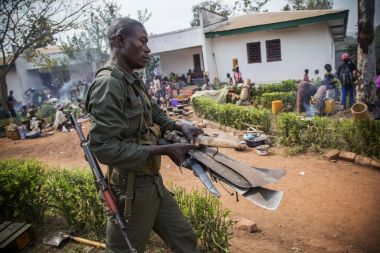Human rights group calls for an end to sectarian violence in CAR

Ending violence in the CAR should be the "top priority" for the International Contact Group meeting today, Human Rights Watch (HRW) said.
"This is a critical moment for international policy makers to say loudly and clearly that those who kill, torture, and rape will one day face a court of law," Daniel Bekele, Africa director at HRW, said.
"The time of impunity is over."
The contact group meeting today (November 11) in Bangui includes representatives from the UN, the EU, the African Union, the US, France and the Republic of Congo. It last met in in July in Addis Ababa.
HRW has urged the group to issue a public declaration reminding all those involved in perpetrating the violence that they will one day face the consequences, either in national courts or before the International Criminal Court (ICC)
An investigation regarding "grave crimes" allegedly committed since August 2012 in the CAR was announced by the prosecutor of the ICC in September.
HRW is also calling on the contact group to encourage increased humanitarian access, and full cooperation between the interim government and the ICC.
"The people of the Central African Republic need to know that international policy makers stand with them in their desire for an end to the violence and for justice," Bekele said.
"While in Bangui, the contact group should seize the opportunity to tell the armed actors directly that they must respect international humanitarian law."
The Central African Republic has been beset by violence since the majority-Muslim Séléka drove out President Francois Bozizé in a coup in March 2013. Though the group has since disbanded, they continued to target towns and villages across the country, which caused the uprising of an opposing Christian faction, the anti-Balaka.
Both groups have only loose ties with their religious affiliations, and Muslim and Christian leaders from CAR have united to condemn the conflict.
A ceasefire agreement was signed on July 23, but sectarian violence has recently been escalating in central and eastern regions of the country. A fresh wave of fighting in October "aggravated the humanitarian situation across the country," a UN report warned.
Spokesperson for the Office for the Coordination of Humanitarian Affairs (OCHA), Jens Laerke, said that the displacement of people remains a "massive humanitarian emergency".
In all, 410,000 civilians have been displaced and thousands killed since the initial uprising. An estimated 2.2 million of CAR's 4.6 million population are currently believed to be in need of humanitarian aid.
Christophe Boulierac, spokesman for the UN Children's Fund (UNICEF), said that the organisation is "rushing" critical supplies to thousands of children affected by the fighting.











